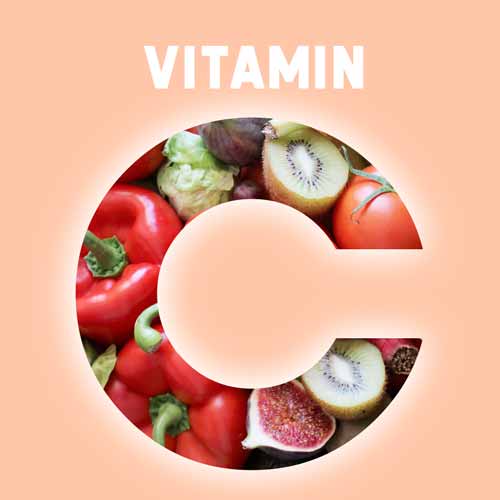
Also known as ascorbic acid or ascorbate, Vitamin C is a water-soluble vitamin that is required for normal growth and development. It is found in various foods and sold as a dietary supplement.
If Vitamin C is present in excess, it leaves the body dissolved in urine. The body keeps a small reservoir of it as it cannot manufacture it. But since it gets flushed out so often, it needs to keep getting replenished.
This makes Vitamin C an “essential” vitamin.
History
Discovered in the early 1900s, it was isolated and then synthesized around 1930 – making it the first vitamin to be chemically engineered.
Not many years after, a Polish-Swiss scientist was able to successfully synthesize the vitamin in bulk. The process is named in his honor and is known as the Reichstein process. This helped in making the manufacture of this vitamin much easier.
Partly for its discovery, Albert Szent-Györgyi and Walter Norman Haworth were awarded the 1937 Nobel Prizes in Physiology and Medicine and Chemistry, respectively.
Importance & Function
Vitamin C is an essential nutrient that is involved in the process of tissue repair as well as the enzyme-based production of some specific neurotransmitters.
It can:
- Form important proteins used to make skin, tendons, ligaments, and blood vessels
- Heal wounds and form scar tissue
- Repair and maintain cartilage, bones, and teeth
- Aid in the absorption of iron
Additionally, it is required by the immune system for its maintenance and proper functioning.
Vitamin C also acts as an antioxidant as it gives electrons away to enzymes.
It acts as a co-factor to enzymes in several biochemical reactions in our body.
Infection
Studies suggest that consuming Vitamin C regularly reduced the duration and severity of common colds by 8% in children and 12% in adults.
There was also a conclusion drawn later that proved Vitamin C potentially prevents Upper Respiratory Tract infections.
Vitamin C distributes readily in high concentrations into immune cells, has antimicrobial and natural killer cell activities, promotes lymphocyte proliferation, and is consumed quickly during infections, effects indicating a prominent role in immune system regulation.
Cancer
Some studies suggest certain evidence that points towards a weak link between the consumption of Vitamin C and the reduced risk of cancer.
One other study claims that ascorbic acid acts as an antioxidant, thereby reducing the adverse effects of chemotherapy and radiation therapy.
Brain Function
A 2017 systematic review found lower vitamin C concentrations (among other micronutrients such as Vitamin B12 & E) in people with cognitive impairment, including Alzheimer’s disease and dementia, compared to people with normal cognition.
Sources
| Plant-based Source | Amount (mg per 100g) |
| Acerola | 1677 |
| Indian Gooseberry | 445 |
| Guava | 228 |
| Yellow capsicum | 183 |
| Red capsicum | 128 |
| Kale | 120 |
| Kiwi, Broccoli | 90 |
| Papaya | 60 |
| Orange, Lemon | 53 |
| Tomato | 14 |
Supplements
Vitamin C dietary supplements are available in the form tablets, capsules, drink mix packets, in multi-vitamin/mineral formulations, in antioxidant formulations, and as a crystalline powder.
Vitamin C is also added to some fruit juices and juice drinks – thereby making them fortified.
Tablet and capsule content ranges from 25 mg to 1500 mg per serving, depending upon personal needs.
The most commonly used supplement compounds are ascorbic acid, sodium ascorbate, and calcium ascorbate.
Recommended Daily Allowances for Vitamin C
| RDA (children ages 1–3 years) | 15 mg/day |
| RDA (children ages 4–8 years) | 25 mg/day |
| RDA (children ages 9–13 years) | 45 mg/day |
| RDA (girls ages 14–18 years) | 65 mg/day |
| RDA (boys ages 14–18 years) | 75 mg/day |
| RDA (adult female) | 75 mg/day |
| RDA (adult male) | 90 mg/day |
| RDA (pregnancy) | 85 mg/day |
| RDA (lactation) | 120 mg/day |
| UL-Upper Limit (adult female) | 2,000 mg/day |
| UL-Upper Limit (adult male) | 2,000 mg/day |
Deficiency disease
Scurvy is a disease that results from a deficiency of Vitamin C.
Without this vitamin, a protein known as collagen made by the body is too unstable to perform its normal function and several other enzymes in the body do not function properly.
Scurvy is characterized by spots on and bleeding under the skin, spongy gums, ‘corkscrew’ hair growth, and poor wound healing.
The skin lesions are most abundant on the thighs and legs, and a person with the ailment looks pale, feels depressed, and is partially immobilized.
In advanced scurvy, there are open, suppurating wounds, loss of teeth, bone abnormalities, and, eventually, death.
If your healthcare professional suspects that you might be deficient in Vitamin C, you would be advised to go for a blood test to confirm the levels of Vitamin C in your body so that proper supplementation or nutritional plan can be advised accordingly. Bhookha Haathi has collaborated with Thyrocare and offers you all such tests and more for the best prices in the market. Moreover, Bhookha Haathi provides customized subscription plans to suit your nutritional requirements that your daily diet might be lacking in to help you lead a healthier life. Find out more on our website!
Written by: Jahnabee Adhikari
Jahnabee is a part-time blogger, full-time dog lover. She believes that writing actually possesses the potential to change the world. She can be often found fantasizing about poetry or buried nose-deep in a Sudha Murthy novel.


